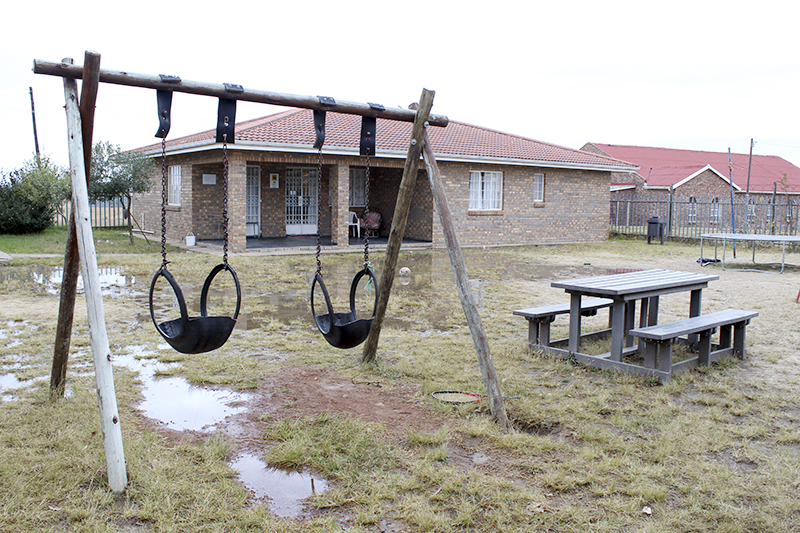Some of Grahamstown’s most vulnerable people lived for a week with their homes surrounded by raw sewage, at risk of life threatening diseases, as council officials struggled to get teams on site.
In Ncame Street social workers caring for children as young as two at the Ikhaya Losizo Cluster Foster Homes, and elderly people living near the intersection of Sani Street, told Grocott’s Mail of days of despair and frustration as they waited for relief from the stench and danger of raw faeces that spilled continuously from sewage mains and flooded their gardens. Diseases transmitted by human faces include cholera and hepatitis.
At the Child Welfare-run facility, the nightmare started on Thursday 27 July when sewage burst from the inspection cover in Ncame Street and gushed into the yard, first surrounding the offices, before filling the children’s garden and playground with the toxic sludge.
For 16 children between the ages of 2 and 18, Ikhaya Losizo is the only home they have. Also affected was the adjoining no-fee Nompumelelo Pre-school, a daily safe haven for 67 children from indigent families.
According to what Grocott’s Mail documented from the accounts of Child Welfare social workers, Nompumelelo’s principal Bukiwe Gqeke and a parent, at least five phone calls were made to various officials, and three personal visits to council offices, starting that day, with promises made that it would be attended to. It was only five days later, Tuesday 1 August, after the Mayor herself intervened following a personal visit to her office from a social worker, that a team arrived around 10.50am and unblocked the drain.
The children’s home had a day’s respite before the sewer exploded again into the children’s yard, around 11.30am on Thursday 3 August.
Social work intern Amanda Mata said she’d spoken directly to water and sanitation manager Ntombi Tshicelela,who responded immediately, instructing her team to go to the site.
Later with still no sight of relief, social worker Tendai Wapinduka went personally to the City Hall, this time with a male colleague.
Security were reluctant to allow them in, saying everyone was at a memorial service. The social worker called the Mayor’s office and asked for a face to face talk. That staff member came down and waited with the social worker for the site team leader, Wapinduka said.
What happened then was the last straw as far as Wapinduka was concerned.
The site team leader (whose name is known to Grocott’s Mail) arrived and Wapinduka told him of the urgency of the situation.
The site team leader said he knew about it and would attend to it the following day (Friday 4 August). When Wapinduka protested, she said, he looked at her, turned and walked into the memorial service. Wapinduka was then informed that HR had issued an instruction for every staff member to attend the memorial service.
“I was furious,” Wapinduka said. “I asked him if that was more important than the health of 83 children.”
It was after this encounter that Grocott’s Mail was informed about the situation.
“We are so saddened and disheartened that they do not understand the serious health risk they are exposing our children to,” social worker Kim Wright wrote.
A team of plumbers eventually arrived on site on Friday morning around 9.30am, and Grocott’s Mail saw them unblock the drain. According to the social workers there have been no subsequent leaks and lime was spread over the yard to disinfect the area.
Extension 5
Two days later Grocott’s Mail was asked to witness another serious sewage spill, further down Ncame Street, near the intersection with Sani Street.
Siphokazi Mpahla had reported a leak around 9am on Friday 4 August and after several calls, a team came out to unblock the drains around midday.
However, by the time she and her neighbours returned from church on Sunday, all hell had broken loose again and three adjacent houses were islands in lakes of faeces, toilet paper, and condoms. She’d hung her washing out to dry before she left. Now the area was knee-deep in foul liquid and she’d resigned herself to leaving her washing hanging.
Nomalanga Mtshalala, 79, next door, is disabled and was unable to use the pallet bridge her son Thando had placed for access to the outside world.
Mpahla said yesterday the spill had been stopped, but returned on Tuesday.
“It was sorted then after soo many calls,” she said.
A source told Grocott’s Mail that some municipal employees had embarked on a go-slow action, after a Council resolution tabled at the 24 June full council meeting put a moratorium on overtime payments, as part of Makana’s efforts to gain control of spending.
However, asked yesterday if this was the case, Samwu branch chairperson Zola Kolisi said he could not confirm this.
“There is no official go-slow,” Kolisi, who was attending a meeting in Kirkwood said. “Everyone is at work.”
In response to Grocott’s Mail’s questions about how cases were prioritised, Makana’s Communications Officer Yoliswa Ramokolo said the Sanitation section attends to complaints as soon as possible, with a turnaround time of 48 hours “but also depending on the severity and position of the spillage and effect thereof”.
Asked if there might be consequences for the team leader who attended a memorial service and did not go to the site of the spillage, Ramokolo said, “The delay was not due to the memorial service. There was a team on standby to attend to complaints.”
She said it was not the team leader’s job to attend to a complaint.
“The team leader’s job is to ensure a team is dispatched.”
Sanitation workers had not been compelled to attend the service, she said. “There was a notice, but essential services were exempted.”
Asked why the problem kept recurring, Ramokolo said blockages were caused by foreign objects thrown into inspection covers, as well as flushed down toilets by residents.


